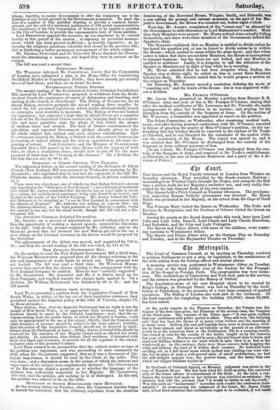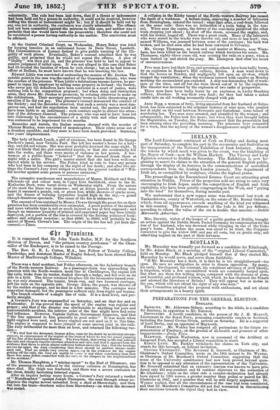thr Alttrupulis.
The Court of Common Council, at its meeting on Thursday, resolved to petition Parliament to put a stop, by legislation, to the continuance of the evils arising from the betting-offices and similar places.
A morning service was performed in Westminster Abbey on Tuesday, at the close of the third jubilee year of the Society for the Propaga- tion of the Gospel in Foreign Parts. The congregation was very nume- rous. The Archbishops of Canterbury and York took part in the service, and the sermon was preached by the Bishop of Oxford.
The foundation-stone of the new Hospital about to be erected by King's College, in Portugal Street, was laid on Thursday by the Arch- bishop of Canterbury, in the presence of a very large company of genteel spectators. The Bishop of London also took part in the ceremony. Of the fund requisite for completing the building (60,000/.) about 36,3801. has been raised.
At the yacht regatta in the Thames on Saturday, the Volante was the winner of the first-class prize, the Phantom of the second-class, the Vampire of the third-class. The reporter of the Times says—" It was quite evident that our yachtsmen still prefer poetry to effect. They still love the bellying sail,' that has been the theme of so many verse-writers and the marring of so many races. Balloon jibe and gaff topsails there were in abundance, swol- len to their utmost, and about as serviceable as the paunch of an alderman would be to the American Deer or the Paddington Pet in a running-match. One looked in vain for the results of the lesson taught us by the America last year at Cowes. Nowhere could be seen a flat sail braced close to boom and mast and bidding defiance to the wind which in spite blew it as fast as the wind could go : on the contrary, there were those concave folds hugging the wind and making the least of it within their recesses. No hollowed bows swelling out in a full broad beam which melted into yielding run were visi- ble, but in place of such a well-proved style of naval architecture, we had the stiff straight angular bow, the narrow beam, and the lanky thin run which our clipper-builders rejoice in."
In the Court of Criminal Appeal, on Monday, judgment was given in the case of Hannah Moore. She had been tried for child-murder, but convicted only of the lesser offence of concealment of the birth. At the trial, a con- fession the woman had made to her mistress was admitted as evidence : the mistress had told the prisoner that " it would be better to tell the truth." Was this such an " inducement " to confess as to render the confession inad- missible? In pronouncing the judgment of the Court, Mr. Baron Parke said, it had been admitted that confessions ought to be excluded, if not made
voluntarily. The rule had been laid down, that if a threat or inducement had been held out by a person in authority, it could not be received, however trifling the threat or inducement might be ; but if it should be held out by any one not in authority, the confession was clearly admissible. The offence had not been committed against the mistress in this case, and neither was it probable that she would have been the prosecutrix ; therefore she could not be considered a person having authority in the matter. The conviction must be affirmed.
At the Central Criminal Court, on Wednesday, Henry Baker was tried for keeping. lunatics in an unlicensed house in Doris Street, Lambeth. The Commissioners of Lunacy desired to give public warning of the ille- gality of such places. Eventually, Baker's counsel admitted that he was guilty, and promised that he would not repeat the offence. A plea of "Guilty" was then put in and the prisoner was held to bail to appear to receive judgment if called upon. It was not alleged in this case that Baker had ill-treated the lunatics of whom he took charge ; but as he had been an officer at Bedlam, he must have known that he was breaking the law.
Edward Little was convicted of embezzling the monies of Mr. Daukes. The notable point in the case was the conduct of the Guarantee Society, who were the sureties of the prisoner. When Little's defalcations became known, he pro- posed to repay his employer by selling some property in Ireland : the Society, who never pay till defaulters have been convicted in a court of justice, were nothing loth to the composition proposed ; but when delay and obstruction arose, they drove Mr. Daukes to prosecute, by refusing otherwise to make up the defalcations. Their secretary previously wrote to Little threatening pro- secution if he did not pay. The prisoner's counsel denounced the conduct of the Society ; and the Recorder observed, that such a society was a most dan- gerous one, and had the negotiation been carried out, the parties would all have been liable to an indictment : such conduct ought to attract the atten- tion of the Attorney-General. The prisoner, who was said to have been led into dishonesty by the encumbrance of a sickly wife and other distresses, was sentenced to be imprisoned for six months.
Bemerino and Antola, the Italian seamen charged with the murder of Thomas Murley, were convicted of manslaughter. 'Their crime arose out of a drunken squabble, and they seem to have been much provoked. Sentence, two years' imprisonment.
The body of Sarah Leach, a girl of nineteen, has been found in Sir George Duckett's canal, near Victoria Park. She left her master's house for a holy- day, and did not return. She was most probably drowned the same night. It was not likely that the girl committed suicide, or that she accidentally fell into the water, sad there were marks of violence on her person. A bar- woman at a public-house " believed " that the deceased drank there at night with a sailor. The girl's master stated that she had been well-con- ducted while in his service. The Police tried in vain to trace any person who had been in her company on the night of her death ; and after two sit- tings the Coroner's Tury were obliged to return the general verdict of " Wil- ful murder against some person or persons unknown."
The extensive warehouses and manufactory of Messrs. Hubback and Sons, wholesale oil and colour men, in Upper East Smithfield, close to the St. Katherine Dock, were burnt down on Wednesday night. From the nature of the stock the blaze was immense ; and as divers parcels of colour were burnt it assumed a purple, red, or green hue, while showers of sparks arose, and the flames of burning turpentine leaped high to the sky,—a grand though disastrous spectacle. The cause of the fire is unknown.
The amount of loss sustained by Messrs. Clowes through the great fire on their premises has been considerably over-estimated. A great portion of the smaller and more valuable type is not so much injured as was at first supposed ; and though an immense quantity of printed and unprinted paper has been totally destroyed, yet a portion of the loss is covered by the floating policies of book- sellers and religious societies ; so that 40001. to 5000/. will probably be the extent of Messrs. Clowea's loss. The origin of the fire has not yet been die- covered.—Tinier.



























 Previous page
Previous page